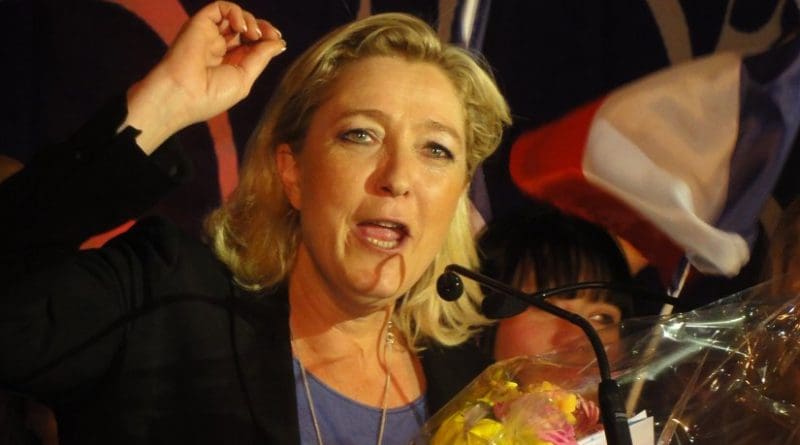France: Le Pen Sets Out Blueprint For Government
By EurActiv
By Davide Basso
(EurActiv) — Far-right candidate Marine Le Pen has unveiled how she plans to govern France if she wins the run-off against President Emmanuel Macron, stressing that she would rely on “consulting the people” through referendums. EURACTIV France reports.
Le Pen came second in the first voting round on 10 April, narrowly beaten by Macron, setting the stage for a tight run-off scheduled for 24 April.
The far-right leader told a press conference on Tuesday (12 April) she expects to increase the use of direct democracy at the expense of the representative system – something she also wishes to reform.
But the measures she proposed also aim to circumvent, one by one, the obstacles that have prevented the French far-right from gaining power.
A revolution?
In the campaign, her supporters used phrases like “if the people vote, the people win”. In a similar vein, Le Pen confirmed that she would rely on “referendums of popular initiative”.
“I, therefore, intend to consult the only expert that Emmanuel Macron has never consulted: the people,” she said.
It is also “much healthier for the people to vote [rather] than for the two chambers” to decide on constitutional revisions, said Le Pen.
This attempt at bypassing representative democracy is handy for Le Pen and extremist parties in general who have always struggled to get elected MPs, let alone form a majority in parliament.
France holds a parliamentary election on 12 June.
A referendum would bypass the opposition – in case Le Pen became president and then faced a hostile parliament – by going directly to the people.
Reforming representative democracy
Le Pen also wants to reform the way MPs are elected, proposing to have at least two-thirds of them elected by proportional representation.
This would automatically increase the number of deputies from her party, Rassemblement National, as well as from other more radical political parties. According to Le Pen, this would allow a “fair representation of the sensitivities that are expressed in the country.”
To avoid political instability in parliament, the remaining third of MPs would be chosen based on the election winner.
Regarding the presidency, Le Pen wants to introduce a seven-year, non-renewable term of office instead of the current five-year term that is renewable once.
These reforms would give the far-right more seats in the National Assembly, potentially even giving Le Pen’s party a majority there. If they were to still fall short of the majority, it would be a great negotiating tool when forming a government with other groups.
David Rachline, the mayor of Fréjus and a member of Le Pen’s inner circle, told EURACTIV France at Le Pen’s election party on Sunday that she wants to form a “government of national unity”, a “rally against [Emmanuel] Macron’s unbridled Europeanism”.
For this, she would call on right- and left-wing politicians.
Le Pen also wants to create a “bank of democracy”, an idea also supported by some members of Macron’s current majority in parliament but never put in place.
Such a “bank” would aim to help parties and candidates finance their election campaigns when commercial lenders are reluctant to grant them loans. Le Pen herself resorted to loans from Russian banks in the past, and for the 2022 election she took out a €10.6 million loan from a Hungarian bank.
And the media?
Asked about her relationship with the media, Le Pen told the press conference she was “appalled by the way Macron treats the media”, referring to his refusal to appear on certain programmes in the campaign. Macron’s entourage justified this by citing his agenda.
Speaking of the times she systematically barred journalists from her trips, she said she did so on the grounds that they were working for “entertainment programmes” like Quotidien, broadcast on the TMC channel.
However, other media were also excluded, such as journalists working for the online media Les Jours, made up of former members of the left-wing daily Libération.
On Wednesday morning (13 April), during a surprise visit to a factory in Gennevilliers, Le Monde, Libération, L’Obs and L’Express were not invited.
Le Pen said that she has accredited different kinds of media, “including those that are extremely hostile” to the Rassemblement National.
Macron described Le Pen’s proposed measures as the “beginning of an authoritarian drift”, which shows “the true face of the far-right”, despite the efforts of Le Pen’s camp to hide it.
“What she wants to do is what we see in Hungary,” he added, referring to the authoritarian “illiberal democracy” of Prime Minister Viktor Orban.
Organising a debate between the two candidates is also turning out to be challenging, daily Le Monde reported. Le Pen is said to have blocked having several journalists from public broadcaster France 2 at a debate due to their alleged “hostility” towards her.
Le Pen did the same ahead of the first round, and Macron’s team also refused at least one journalist’s name for the debate between both rounds.

